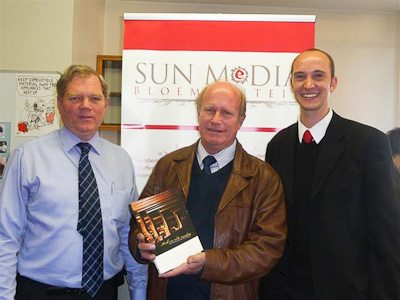Prof. Strauss' book is launched
 |
| At the launch were, from the left: Prof. Francois Tolmie, Dean of the Faculty of Theology at the UFS; Prof. Pieter Strauss; and Wikus van Zyl, Manager: SUN MeDIA Bloemfontein. |
Kerk en orde vandag: Met die klem op die NG Kerk was recently launched at a function in the Faculty of Theology at the University of the Free State (UFS). Prof. Pieter Strauss, Head of the Department of Church History and Polity at the UFS is the author of this book that is published by SUN MeDIA Bloemfontein.
The objective of the book is to provide the reader with an introductory view on the reformed church law. Therefore it concentrates on themes that are spread across the entire spectrum of the reformed church law.
The book endeavours to provide relevant background information for all the articles of the Church Order of the Dutch Reformed Church, but is not exhaustive in this regard. Prof. Strauss refrained from only writing about existing articles as positivist church law on purpose. He wanted to make more of the background, introductory questions and particularly a normative church law.
According to Prof. Andries le Roux du Plooy from the Faculty of Theology at the North-West University, Prof. Strauss gave evidence that he was experienced and excellently informed about all the themes and topics, had personal experience thereof, and that he could write critically and apologetically about it.
“I want to congratulate Prof. Strauss on the publication. To my mind, there are few other theologians that will be able to write about the topic in such a way with emphasis on the DR Church,” said Prof. Du Plooy.